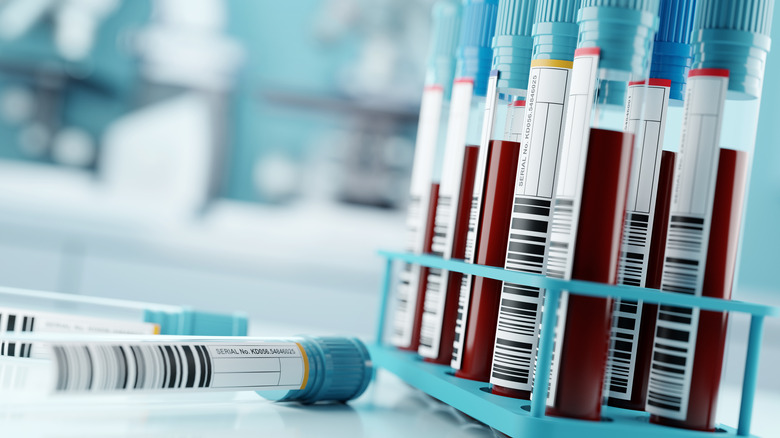What It Means When Your Albumin Is High
Albumin is a protein produced by the liver which circulates in the bloodstream, according to MedlinePlus. The main function of albumin is to prevent the blood from leaking out of blood vessels and entering the surrounding tissues or organs. In addition, albumin helps hormones, vitamins, and enzymes to be delivered throughout the body via the blood.
According to the Cleveland Clinic, an albumin test helps monitor kidney and liver functions. The albumin test is usually recommended alongside other urine and blood analytic tests. For this test, a healthcare provider in the lab takes some blood samples from the patient's arm that fills up a vial or two (via Healthline). This sample is then analyzed in a lab to determine albumin levels in the blood. Based on whether the readings are high or low, a doctor may be able to diagnose what's wrong with these organs and identify symptoms of kidney disease or liver disease, explains Cleveland Clinic.
What does a high albumin level mean
According to UCSF Health, the normal range of albumin is 3.4 to 5.4 grams per deciliter (34 to 54 grams per liter). However, the range might be slightly different for different labs.
If the albumin levels are above 5.4 grams per deciliter, you may be severely dehydrated, as per MedlinePlus. This may be due to causes such as diarrhea.
Another typical reason for high albumin levels in your system could be because of a high-protein diet, according to MedicalNewsToday. A study published in the Scandinavian Journal of Gastroenterology revealed that heavy consumption of protein-rich foods might lead to a 30% increased production of albumin.
According to Healthline, if a urine test during pregnancy reveals high levels of protein, it is usually a sign of preeclampsia. This dangerous pregnancy complication risks the lives of both the baby and the mother. If a pregnant woman has high levels of albumin in her body this could correlate with the severity of pregnancy-related hypertension, as per a 2010 study published in The Journal of Obstetrics and Gynaecology Research.
In any case, it's always best to seek the proper treatment for high albumin levels and prevent further health complications.


